- Home
- Keith R. A. DeCandido
Nevermore Page 6
Nevermore Read online
Page 6
Sam just snorted, and then went into the kitchen, Dean assumed in search of a cup of coffee that he would violate with too much milk and sugar.
Dean turned his attention back to the record collection. Is that actually a copy of Music from Big Pink? Awesome!
The hardest part was finding somewhere to park the Impala.
The Poe Cottage was located at the intersection of the largest thoroughfare in the Bronx, the aptly named Grand Concourse, and another major street, Kingsbridge Road. According to the Internet research Sam had done before leaving Manfred’s place, Kingsbridge Road used to be a horse path that led to the King’s Bridge, which went over the Harlem River to Manhattan. He had also found a Poe enthusiast’s web site, which had actually mentioned both murders and their connection to the author. He left it up on the screen for Dean to look at—assuming his brother could tear himself from Manfred’s record collection, which Sam fiercely doubted.
A park sat in the midst of the intersection, stretching across several blocks, and it included a bandstand and a playground, both looking rather new, and a small white cottage that looked incredibly out of place. He understood why Dean had been so reluctant to believe that there was such a place in the Bronx. The whole city—aside from Manfred’s neighborhood in Riverdale—seemed geared toward cramming as many buildings as close together as possible. Even in neighborhoods with houses, they tended to be rammed up against each other.
And yet, there in the midst of a tangle of streets that were lined with apartment buildings at least five stories high, and often higher, was this park and this cottage.
Sam maneuvered around several side streets, most of them one-way, as well as the two big streets, and tried desperately to find a spot in which the Impala would fit. He drove around for ten minutes, getting particularly frustrated with the roller coaster of emotions as he’d see an empty space, only to discover that it was a fire hydrant, then find another, only to see another hydrant. How many damn hydrants does this city need, anyhow? On those rare occasions when the empty space wasn’t a hydrant, it was way too small to fit the Impala.
While he was driving, Sam also noticed that the people were making the best of the crowded situation. While he and Dean moved around a lot with Dad, they tended toward smaller towns, in part because Dad felt that they had better public school systems than the ones in big cities—though Sam’s later research revealed that not to be nearly the universal constant Dad had insisted. As a result, his experiences with big cities were few and far between.
The thing that struck him the most was the diversity and the harmony, which was on par with what he’d seen at Stanford—but you expected that at a college campus, especially somewhere like Stanford. Here, he saw people from about twelve different nationalities walking the streets, using the small storefronts on the ground floors of the apartment buildings, playing in the playground in the Poe Park, chatting with each other, saying hi on the street, and so on. His (admittedly minimal) experience with larger cities was that ethnic groups tended to congregate in particular neighborhoods, but he wasn’t seeing as much of that here in the Bronx as he’d expected.
Like Dean, his primary reference point for the borough was the infamous 1981 movie Fort Apache, the Bronx, so he’d imagined a place filled with burned-out buildings, roving street gangs, and the like. What he’d seen so far, though, indicated a place that had the crowds of a big city, but within the neighborhoods were still communities.
Or maybe I’m just romanticizing the whole thing, he thought with a laugh as he passed yet another open spot in which maybe a Mini Cooper could fit, but not any car built in 1967.
Finally, he saw someone pulling out of a spot at the corner of East 192nd Street and Valentine Avenue, right on the border of the park. It was a spot with a parking meter, which was annoying, but at least that meant the Impala would fit. The meters had been installed decades ago and were spaced according to typical car size at the time. The Impala was pretty close to normal size when it was first released, so he was easily able to slide into the spot.
Dipping into the laundry supply, he put in two quarters, which would keep the spot legal for an hour. Given the size of the place, he couldn’t imagine his tour would last any longer than that.
Sam locked the Impala and then walked through the Poe Park, past the bandstand—empty on this chilly November afternoon—and the playground—where six kids were playing and screaming and giggling, while four women kept an eye on them. As he passed, he heard the women conversing with each other in what he was pretty sure was Spanish.
The Poe Cottage stood out even more close up than it did from the road. From what he’d seen on the Bronx County Historical Society’s website, it had been built in 1812, and Poe lived in it with his wife and mother-in-law from 1846 to 1849.
As he approached the front door, he reached into his coat pocket and turned on the EMF meter. He wouldn’t take it out in front of the tour guide, but hoped he might have a chance to glance at it when the man wasn’t looking.
Standing in the doorway was the tour guide in question: a short African-American man wearing a beige trench coat. “You Anthony?” Sam asked as he approached.
“Yeah,” the guide said. “Glad you could make it.”
Grinning sheepishly, Sam said, “Yeah, sorry, couldn’t find anywhere to park. And I drive a boat, so it’s even harder.”
Anthony’s head tilted. “What do you drive?”
“A ’sixty-seven Impala.”
Smiling, Anthony backed away from the wooden door and let Sam into the dark front room of the cottage. “I feel your pain. My Pop had a ’fifty-seven Buick. Spent half his life tryin’ to find somewhere to park the stupid thing. Anyhow, welcome to the Poe Cottage.”
Sam looked around and saw various old kitchen utensils, a fireplace, and, right by the front door, a desk with postcards and other souvenirs. Behind the desk was a glass case filled with books that ranged from collections of Poe’s writing to books about New York in general and the Bronx in particular.
“Before we start,” Anthony said, “we usually ask for a ten dollar donation for individual tours.”
Of course you do, Sam thought, trying not to sigh. Once again he dug into his pocket, hoping that the ten he gave Dean at the bridge wasn’t his last big bill.
Luckily, it wasn’t. He found a twenty in the money clip and handed it over. Anthony reached under the desk with the postcards, pulled out a cash box, and retrieved a ten for him.
“What’d you do to your hand?” Anthony asked, indicating Sam’s cast with his head.
Where Dean probably would’ve had some kind of smartass response, Sam found he couldn’t think of anything funny enough for a total stranger. And the truth would hardly suffice. Oh, well, I broke my hand when I was fighting a zombie in a graveyard. See, I was trying to lure her back to her grave so my brother and I could impale her in it so she’d die again. No, I’m not crazy, and why are you backing slowly away from me like that?
“It’s a long story,” he mumbled.
That seemed to satisfy Anthony. “Okay. Well, this is where Edgar Allan Poe lived for the final years of his life.” He proceeded to tell Sam several things he already knew from reading the website. “Unfortunately,” Anthony added, “you can’t really appreciate the view now.” He moved past Sam to reopen the door. “But if you look over there—” He pointed to the left. “—you can see that it goes downhill right at Valentine Avenue?”
Sam nodded. He’d actually gone down that hill briefly in his endless search for a parking spot.
“The cottage was right on the top of the hill, and you could see all the way to the Long Island Sound from here. This isn’t where it was originally built.” Now pointing across Kingsbridge Road, he said, “You see that apartment building with the yellow façade? It was about there. It was moved here when the park was built. This whole area used to be farmland owned by the Valentines, a Dutch family. They’re the ones the avenue’s named after. The Poe family rented the
cottage, and they could barely afford it.”
“I saw that on the website,” Sam said, “and I thought it was kinda odd. I mean, Poe’s one of the most popular American writers. And he was broke?”
“Oh, definitely. I mean, yeah, he was popular, and still is. Aren’t too many writers that get football teams named after them, even if it’s one step removed.”
Sam frowned, then remembered that the Baltimore football franchise was named the Ravens. Poe died in Baltimore, and was buried there, and the team was named for Poe’s most popular poem.
“And none of his stories have ever gone out of print. But most of the money he made from his writing got sunk into magazine endeavors that failed. Anyhow,” Anthony led Sam into the next room, “we’ve re-created the atmosphere of the cottage as best we can. Obviously, most of the furniture isn’t available, but we’ve done our best to put the types of furnishings that would’ve been present, given the time and the Poes’ level of poverty.”
Sam followed Anthony into what had to be the largest room in the cottage, which included a fireplace—now closed, according to Anthony—a chair, a writing desk, and some framed pictures. There was also a hanging bookcase on the wall, each shelf filled with old-fashioned leather-bound volumes in what Sam knew was a popular binding style in the mid-nineteenth century. “These hanging shelves were more common in those days, since the floors were almost never even—as you can see,” Anthony added with a grin.
Grinning back, Sam shifted his weight back and forth on the creaky wooden floors.
Anthony continued: “The wood warped when it got damp, too. A bookcase on the floor just wasn’t practical.” He pointed to the wall. “That’s an illustration of the cottage.”
Walking over to peer at it, Sam saw the exact cottage he was standing in, at the top of a steep hill that matched the contours of Briggs Avenue and East 194th Street when he had driven down and up those respective streets. The surrounding ground, though, was all grass and trees. It seemed idyllic.
“Poe’s wife Virginia was very sick—what they called consumption back then, which we now know as tuberculosis. He’d come to New York in 1844 to engage in those publishing endeavors that bankrupted him, and when Virginia got more sick in 1846, they moved up here, hoping the country air would do him some good.” Anthony smiled. “Y’know, I still have trouble saying that with a straight face. Don’t get me wrong, I love it here, but country air?”
Chuckling, Sam said, “Yeah, it is a little weird. But different times, I guess.”
“Oh yeah. The Bronx was a bunch of farms in the eighteenth and nineteenth centuries, owned mostly by families like the Valentines, the Johnsons, and, of course, the first settler, Jonas Bronck—the peninsula used to be called ‘Bronck’s Land,’ and that’s where the name comes from. Anyhow, Poe set up a room just for Virginia when she got sicker.”
Anthony led Sam into the next room, which was actually a hallway that included a door to a stairway up, the cottage’s back door, and another, much smaller room, that included a bed, a nightstand, and little else. The bed wasn’t particularly large, had a solid wooden headboard and an uneven mattress.
“We’re pretty sure this is the actual bed that Virginia died in. We’ve modified it a bit—the original had hay in it, but that gets disgusting pretty quick, so we replaced it with those Styrofoam popcorn things they put in packages.”
Sam couldn’t help but bark a laugh at that. “Really?”
“It’s not period, but it doesn’t stink up the joint, either.” Growing serious again, Anthony talked a bit about how Poe’s mother-in-law Maria Clemm did most of the work around the house and took care of Virginia while Poe worked and took long walks, and a little about the upstairs and downstairs areas, which were converted for use by the Historical Society and not open to the public. Sam tuned much of it out, thinking more about what it meant that Virginia Poe died in this bed, in virtually this very spot. Okay, moved across the street, but could the spiritual energy from that night still be present, even though it was a hundred fifty years ago?
When he was done talking about Virginia Poe, Anthony left the bedroom, pushed past Sam in the small confines of the back area, and pointed to a picture on the wall. Sam ignored him, instead taking advantage of Anthony having his back to him to pull out the EMF reader.
Unfortunately, it didn’t read a damn thing. Well, it was a long shot.
Anthony talked a bit more about the house, about Poe’s life, and about the plans to renovate the house and the surrounding area, including a visitor’s center, which was being held up by city bureaucracy. Sam made some sympathetic noises, bought a couple of postcards—a picture of the house and a portrait of Poe himself—and then decided to go for broke. “Hey, have you heard about those murders?”
Up until now, Anthony had been pleasant and genial and friendly. As soon as Sam asked that question, though, it was like a cloud came over his dark features. “Okay, that’s it. Get out.”
Feigning innocence, Sam asked, “I’m sorry?”
Moving toward the door, as if to crowd Sam toward it—though not actually touching him—Anthony said, “Look, it’s bad enough I have read this crap on the Internet, I ain’t about to—”
“Whoa!” Sam held up his hands and refused to be moved. Anthony, to his credit, stopped moving forward. “I just read something in the newspaper and it threw me, that’s all. It’s no big deal.”
“It’s a coincidence,” Anthony said firmly. Sam suspected he’d gotten this question quite a bit since the Reyes murder. “That’s all.”
Sam quickly took his leave and went back to the car. While there wasn’t any EMF reading, the death of a loved one was probably still a good focal point for a ritual. The question is, what ritual? When he got into the car, he pulled out a Bronx street map he’d picked up the previous day on their way to the zoo, and figured out the best way to the corner of Webb Avenue and West 195th Street, where the body had been bricked up.
It actually looked to be a fairly easy drive, as that intersection was just two blocks north of Kingsbridge Road. Unfortunately, when he got there he realized that he couldn’t make the right he wanted to onto Webb Avenue, as it was one-way the wrong way. So he made a right onto Sedgwick, figuring to make a right onto 195th—which was also one-way the wrong way. Finding himself coming around to Dean’s animus toward driving in this city, Sam drove up another block to 197th—and what the hell happened to 196th?—made a right, drove a block to Webb, and made another right.
His concerns about finding the right house were unwarranted. For one thing, that corner only had two houses on it, the rest of the buildings being apartments. For another, the house he wanted stood out by virtue of being brown stucco as opposed to the red brick that every other surrounding building was made of. It was also the only one with crime-scene tape, not to mention a sign that read for sale.
Deciding it would be better to come back at night, and with Dean for backup, he drove off. Besides, he couldn’t find a single parking spot in the area—maybe that would be easier at night.
As he drove off, he saw a battered old Honda Civic double-parking in front of the house, and a short mousy-looking guy with a big nose get out. He normally wouldn’t have given the guy a second thought, but he was parked right in front of the house where the murder took place—and he also looked irritatingly familiar, though Sam couldn’t figure out why.
Shrugging, he drove down Webb back to Kingsbridge, intending to head over to Cambreleng Avenue where the two kids had died.
SEVEN
The Afiri house
The Bronx, New York
Friday 17 November 2006
Sam could hear Pink Floyd’s “The Great Gig in the Sky” from Manfred’s house before he even parked the Impala—this time finding a spot between two driveways across the street from the house—and he wondered if the same neighbors who objected to Scottso rehearsing in the house would object to Dean blaring the stereo.
Inside, Sam thought he’d be deafen
ed by the music, and was grateful that he came home when Dean was playing the more low-key strains of Floyd rather than, say, Metallica or AC/DC or Deep Purple.
Turning left as he came in, he saw Dean in the easy chair—it was a recliner, which he knew because Dean had reclined it all the way back, his feet up—air-drumming with his right hand while flipping pages of Dad’s journal with his left. Albums were strewn all over the floor. Sam’s laptop was on the coffee table, precariously balanced on some old newspapers and magazines. Wincing, Sam walked in and moved it to the couch—an action that also yanked the power cord out, which went some way toward explaining why Dean had been so careless with the laptop.
Only now noticing Sam’s arrival, Dean grabbed a remote off the floor next to him and turned the volume down. “Sorry about that, Sammy, but the battery was running low, and the only free plug was over there.” He pointed at the now slack power cord, which snaked around to a plug by the living room doorway.
“Whatever. Find anything?”
“Actually, I did.” Dean reached down and pushed the brown lever on the side of the easy chair, which brought it back upright and the footrest down with a solid thunk. “And it isn’t exactly what you’d call great news.”
Not liking the sound of that, Sam said, “Hold that thought. I need some more of that coffee.”
Dean grinned and grabbed a mug that was on the coffee table. “Just made a fresh pot ten minutes ago. Help yourself.”

 Alien
Alien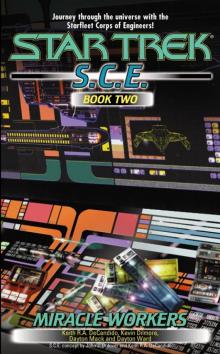 Miracle Workers
Miracle Workers Articles of the Federation
Articles of the Federation Supernatural Heart of the Dragon
Supernatural Heart of the Dragon War Stories: Book Two
War Stories: Book Two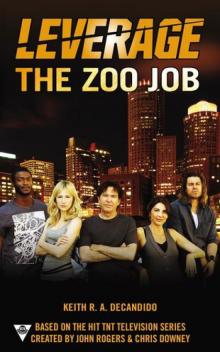 The Zoo Job
The Zoo Job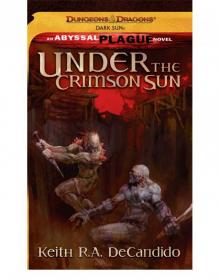 Under the Crimson Sun
Under the Crimson Sun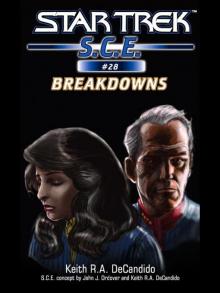 Breakdowns
Breakdowns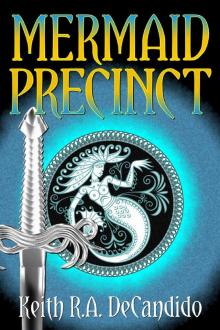 Mermaid Precinct (ARC)
Mermaid Precinct (ARC)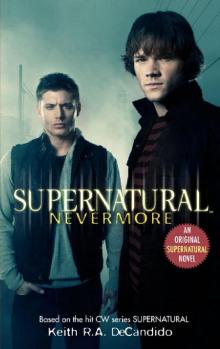 Supernatural 1 - Nevermore
Supernatural 1 - Nevermore STAR TREK - The Brave and the Bold Book One
STAR TREK - The Brave and the Bold Book One Four Walls
Four Walls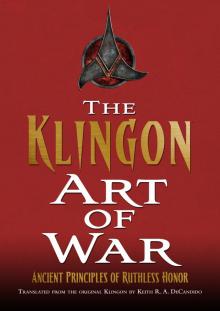 The Klingon Art of War
The Klingon Art of War Blackout
Blackout War Stories: Book One
War Stories: Book One The Brave and the Bold Book Two
The Brave and the Bold Book Two Honor Bound
Honor Bound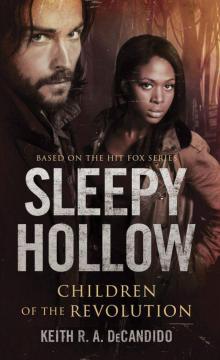 Sleepy Hollow: Children of the Revolution
Sleepy Hollow: Children of the Revolution Worlds of Star Trek Deep Space Nine® Volume Three
Worlds of Star Trek Deep Space Nine® Volume Three Star Trek: TNG: Enterprises of Great Pitch and Moment
Star Trek: TNG: Enterprises of Great Pitch and Moment Genesis
Genesis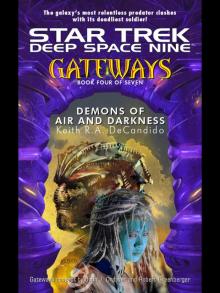 Demons of Air and Darkness
Demons of Air and Darkness Star Trek - TNG - 61 - Diplomatic Implausibility
Star Trek - TNG - 61 - Diplomatic Implausibility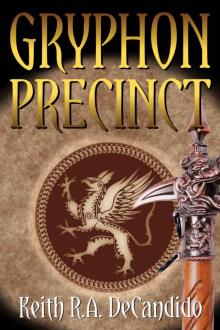 Gryphon Precinct (Dragon Precinct)
Gryphon Precinct (Dragon Precinct)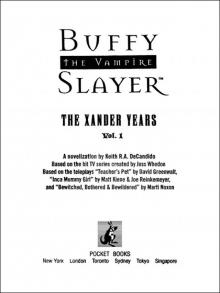 THE XANDER YEARS, Vol. 1
THE XANDER YEARS, Vol. 1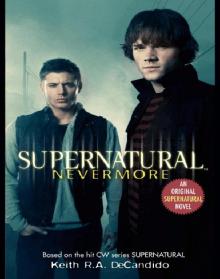 Nevermore
Nevermore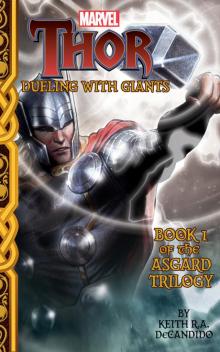 Thor
Thor The Brave And The Bold Book One
The Brave And The Bold Book One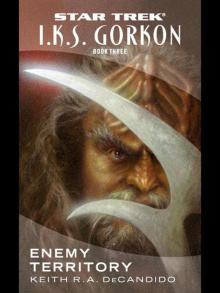 I.K.S. Gorkon Book Three
I.K.S. Gorkon Book Three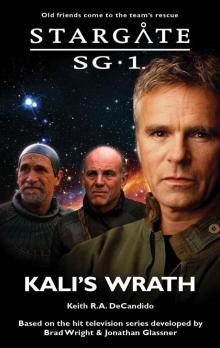 STARGATE SG-1: Kali's Wrath (SG1-28)
STARGATE SG-1: Kali's Wrath (SG1-28) Bone Key
Bone Key Guilt in Innocece
Guilt in Innocece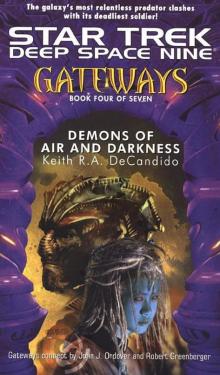 Star Trek - DS9 Relaunch 04 - Gateways - 4 of 7 - Demons Of Air And Darkness
Star Trek - DS9 Relaunch 04 - Gateways - 4 of 7 - Demons Of Air And Darkness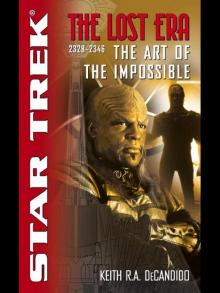 The Art of the Impossible
The Art of the Impossible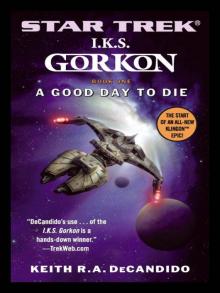 I.K.S. Gorkon Book One: A Good Day to Die
I.K.S. Gorkon Book One: A Good Day to Die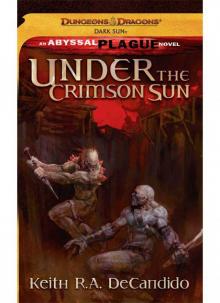 Under the Crimson Sun (the abyssal plague)
Under the Crimson Sun (the abyssal plague) DIPLOMATIC IMPLAUSIBILITY
DIPLOMATIC IMPLAUSIBILITY Tales from the Captain's Table
Tales from the Captain's Table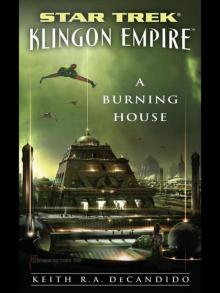 A Burning House
A Burning House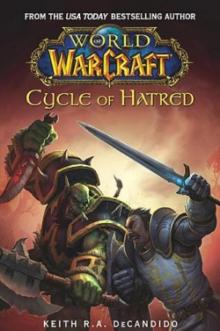 Cycle of Hatred (world of warcraft)
Cycle of Hatred (world of warcraft) Have Tech, Will Travel
Have Tech, Will Travel Security
Security